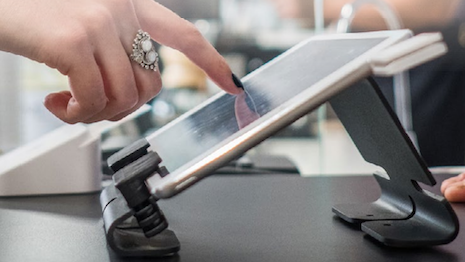While physical stores are not evaporating, the future of retail requires a reimagining of physical space to seamlessly integrate with digital platforms.
According to business advisory network BDO’s 2021 Retail Digital Transformation Survey, 10 percent of retailers say superior technology is their top competitive differentiator, down from 25 percent in early 2020. The innovations developed during the pandemic will be valuable, but to propel business forward, retailers will need to double-down on investments that integrate their digital and physical shopping experiences.
"Digital should be considered as a key catalyst for success and/or an enabler for capturing new opportunity, reducing costs and creating shareholder, stakeholder and customer value," said Robert Brown, digital retail leader at BDO. "Technology by itself may not always ensure success, and in some cases, may actually hinder the business.
"Yet, at all times, retailers need to be able to answer the 'why' behind implementing a specific technology, solutions, product or service," he said. "Simply put, any successful digital transformation initiative needs to be grounded in a business strategy and a demonstrable outcome for the business."
The survey was conducted by independent marketing research firm Rabin Research Company in January 2021. It included 100 C-level retail executives at organizations with annual revenues between $100 million and $3 billion.
Key findings
With 85 percent of retailers actively pursuing digital transformation, BDO suggests that “doing digital” is not enough, and to get ahead, retailers need strong execution.
While a quarter of retailers have not yet implemented their developed digital transformation strategies, 36 percent of retailers currently implementing digital transformation plans have all seen clear return-on-investment to date and have high expectations for profitability and revenue gains as a result of digital investments in the next 12 months.
According to BDO, enhancing customer experience is the top digital priority among retailers, but even secondary priorities such as optimizing operational efficiencies across the supply chain, will support an improved customer experience.
"Success in the retail and consumer package goods industries in 2021 should always start with customer experience (CX) strategy," Mr. Brown said. "Determining the desires and needs of the market you serve, and the demographics and characteristics of that market—including consumer desires, sentiment toward your company and sentiment toward your competition is very important to understand.
"Creating a clear CX experience is key to ensuring you understand your customers needs, you are providing the products and services they desire/ require, and most importantly, that you provide it in a manner that customers like and expect."
 A majority of retailers are using mobile points-of-service to elevate the in-store customer experience. Image credit: BDO
A majority of retailers are using mobile points-of-service to elevate the in-store customer experience. Image credit: BDO
Nearly three-quarters of retailers, 70 percent, are using mobile app or in-app purchasing to improve the online and mobile customer experience, while in-store analytics is the top digital solution for the in-store customer experience for 68 percent of respondents.
According to BDO’s analysis, retailers are making both front-and back-end investments to provide a frictionless, convenient and personalized shopping journey across all channels.
Driving operational efficiencies across the supply chain is the second highest digital priority for retailers in 2021, behind improving customer experience. As consumers expect seamless omnichannel experiences, data transparency across the supply chain is critical.
To deliver on these demands, retailers are implementing digital solutions that enable better data and connectivity to improve omnichannel logistics.
More than half of respondents, 55 percent, are using real-time order tracking to improve logistics, and 52 percent are using connected inventory management systems or in-aisle restocking.
Pressure on retailers to reduce costs and increase margins makes automation a valuable lever, particularly during the pandemic recovery. As automation becomes incorporated into various aspects of retail, from the warehouse to the store, it is transforming retail jobs.
According to survey respondents, automation will create more jobs than it displaces. More than half, 51 percent, of retailers are working to upskill their workforce so they can effectively leverage automation and make the most of workplace technologies.
As companies move more of their data and operations online, data protection presents an ongoing challenge. Cyberattacks and privacy breaches are cited by retailers as both their top digital threat overall and top challenge related to IT resilience.
 Almost half of respondents have already implemented digital strategies into their supply chains. Image credit: BDO
Almost half of respondents have already implemented digital strategies into their supply chains. Image credit: BDO
Interoperability with legacy tech was cited as the primary reason digital initiatives fail. BDO suggested that outdated and patchwork IT systems often introduce vulnerabilities that expose retailers to data breaches.
Consumer perspective
With the acceleration of ecommerce and social shopping, consumers have developed growing concerns over privacy. Many platforms have updated their features to better serve consumer privacy, while simultaneously challenging brands and marketers.
After repeatedly facing government and consumer scrutiny for mishandling users’ private information, social media giant Facebook looked to assuage privacy criticisms by being more transparent with consumers about where their data is shared.
Introduced in 2019, Off-Facebook Activity allows users to view a summary of the Web sites and mobile applications that share information with Facebook, as well as clear the information if desired. Users can disconnect this information, and even choose to disconnect future off-Facebook tracking from their accounts (see story).
More recently, app developers and marketers anxiously awaited the release of Apple’s iOS 14.5 update and its enforcement of App Tracking Transparency (ATT). The implications of this shift for mobile advertising have been a topic of discussion and debate since the ATT framework was announced at Apple’s Worldwide Developer Conference (WWDC) in June 2020.
The update grants users the ability to block identifiers for advertisers (IDFA) and opt-out of targeting or tracking. IDFA is a unique identifier for mobile devices and is used to target and measure the effectiveness of advertising on a user level across mobile devices.
Prior to this latest iOS update, users’ IDFAs were available by default, making it easy for advertisers and app developers to target and retarget consumers, deliver customized advertising and measure mobile campaign performance (see story).
"Consumers of luxury brands demand exceptional experiences," Mr. Brown said. "Ensuring technology is utilized to focus on areas such as personalization, simplification of transactions is already largely being performed by key persons, but technology can further extend customer service in a dynamic and responsive 24/7 service.
"There’s room in the luxury space to take digital transformation strategies to the next level for even better CX, which is crucial to a sector who relies so heavily on customer loyalty."
{"ct":"dRqFbjNcv5JjGwpkV8h+tGLmytlNQvuf2M9WJT073Y60OxIC2MtjQd\/N6yReMM3g+Sbx\/FtqHIdFxSVOs+\/dWmDAslRiqEVr3nxDEjGf\/LNBQP6se7DJHVdWy1qH1FWSW5tq0EWtX4wNdkq1Q+zTLkdBt+Yz1uF8liO1orDD6TNXez2NgDadQvwDwvGgeZcsDARkhxxKq\/9hWZdgHykg1u9xAiLaQLzbYG3w2IieXGg63U2OZR8MNqi+IiH9P3AebzaNaSXl47ciLCdFoUp0ZQbDwXevLo8uJ\/B7m6z+iOL+G\/zwnxb03lrEm5wUp2IirlGMYZIJ6sILlxT\/fFzGHeJHXVgvCx8Pax\/6HZ9hizXNpc4alnImKUtYiDYVI1\/itdx1Igl0JqUNJLOqk7rci0EK1nY0kk4UT7zyl3K5hdqqbysemjYrRkFIyHA\/nhHEOJyCzfQ1UmgC2aZg7T5qgcCgeZF++rATKxo\/t7kEZ852Mv6fGeMTDkcFCcjp2wK1L0XfZ9+4hAkiTz64nT8pnit7GfWSO2Zy4yk3C5Lcvo\/y8344HQXVUUiqsoVLv3FWNF++YdMmjpecy7SaZztgP7jwutdiIwc4NmTZstDwY3F1y8Pqfldas8OvU77U2mdBDkD5OnZ5GVDixZ6boofdaAXTdnqGVJJ4IvU66XTm5\/3lxCgBKL6Hr64hbnf6XKCDDDIb6jkujAJPtNBc6g8SGW2INN7WkQ8AaII8HkOLwvbQuxCiaRV8dwd3pErjq661mv\/ZhAup\/s74MyjvvgZ2s8bbb2fWr2qmpzP7IitputGVyTQjXrL5hCwdb5T0K1Sk+B1l8IXxV6rjC88\/MEnpLGF1qBahdFs0U5xWt7o5tcjKQrfpvFRCBGhaKdoHlcjgUPxuPApLdC5wE4PIN8vNu7oaYEfW6pFEKJOCwXNmMKiEsg5jwNSsNvjOD5WjSpmBeosLD5hB3gYF93vCeA7dQyOhmSe9eHKLKu35hCjM8U2OwKjQ37lXxtgMp7vduxsR6Fi0vizHNPX8dsE90opnRO8k3KvmO61bf80HLMUolVG5VnSE0WYEQgL2dgEk4pYLnMSGAud\/\/xQtEyIslMAruCoYzsiyztFFZaZPi+hJCVXkbZqSSvnYECTqf4SDFOQmxtoDVOaBDGvXgCfQbKrHl+tE0\/\/vmFQhejRza3Tx\/vUBqJ8R+Z4BnnBdf7jsr\/OHpwzWL0OfjrI4kxdU7SiE9guwdZlT6xslLNahl\/pvdW\/keUfgzHxQVyf0RvrxFhbDjWcljbvf1pTgFLbGfQxT7Oit+DQ1pKFtZ3J9fiBeztvk8Ormt5j27S2UsyjRyGZWSMdqIzEIF9tLals7EVn\/zEKZE8oOMH2wCjI3lmF5pa8KC7u9o+Q5mkYPgiFY4gdNGUECTu+Ryc6cf41czaB1+g6sbXbfhibiqXQM0PahFjUL9VMZUi+ViHs+yq2yzyuoWj8Ujz06\/K0a8tGZ5FbzSQniPw\/acu64CL57g5C6anxpeDXPzm4H6We8EmUsGJtGAetZBzAcKGUJCBAMSSZYXCIYY\/MO4bEyy8ur2mxufqCcU5dyXYHN64FpfzHY5IfDv\/renv6GDYW3Q3F+nu6lR0ExHQ0OXoJbD0jFX8q4\/fI6V\/LuuEp+V9kBAhR97o2fuEJ6pDU2hYA1JOFL3nxFduOtGo56WyzXW0OyY73xyB0gUgx018+23zPdaQ6f6MfhEXTiJkHUCpOjXgwYyx5etj+JWNId\/BHnh1\/lehP7cl+YJ27hmSqr0\/v8eGicoFYZ1SpKRbEKQ9GmUw01ZObZgCZsbV8LFPRAAyxHDNKjj4Uee8ompzXzf8AaFMKY6o9c5XtTk41\/OrBuzIMHrB2OSLk085CSh9zAPVcmprg7JtIIsza3zGQqcLpaBeXQDHpxpoWcZb745\/gs0+mdToCPqxX7A4SJla0gn21x1lTlYNYCmU1Pe5dZKj6H9mWjkOhub35l4xcrQuxr6Y+Rb3b+75OrKJ\/7MOmpvFt7zrG5h44rUculb1TOlz6o7f+Z16dPsiCRkEocGqyZOblFdE5eprofwGdjygpx0UzCKpEO0swE2C7cnI2\/UtgIJpEMwFGIZkH5V88KrPYJTk9+V3pWlnKtM0h7rw\/baz\/h483H9GnwlUQ5Ev+FZFl8wHjCDBbpDzVhKblyQWpHof9niLV+YO104a+m8sCzUSsOJ4\/\/BTG+3ZiObE7leSHOJKFYTJQ49Ko4sWzFdpQ4K\/eSdoWtaM0g\/kHlnsdZg7OWFWlVJUnSxs\/Ezc1rUh+PXf\/snOjGp4HT8TClpJrr2637TktwPexxpLomUuhH5sURsC0OnlpWcBNBTyPpzBkNUZLAo4SCh+qNo3RZPdmMJIBArfnkhhKkdL9aFDQNR157A8yg9DolyMMJGa229B8pwtfZ2lWkQBsAzGGBOmrGLoCl4r45jPp\/qG4tM1HnFr6XnWH1nwde\/Hb5uSjuXu\/V6DdVtQOFfCMJOn5cIGvXLQr0gelO9atCeTZ5Jbkym6KNKJsmqrRJwq54rQCrduY\/dsdOjdUxGy23+rQSrhBCe7+YTevBa4wjAKosG3tYJ5uxFm1O91VrZTvLc9yph3vOojAfuvQuglaObaT24PQCCVBTdXLHeQ619Lmkq1HiMvUgwJOyinBHGgfec0OBA6jYykxVMEEYTFswWqQhKSatPi\/ywcH3f5HClyZgoe5Wx\/uqs3f5mBsyZ7oiUEqbF7tgfEUfzMUFq5cKLX\/5HXKIcFd5wgzAJE1LNhgIvMO5FOp\/2GPICwc1xyJDetU3UdEuz26Zf3GZlLhgxPJODJdTpFfF1ipeiW\/RVtcGO3mAoAe0ULgnR4XGQL+qhLMvcnBmY4B92rgxVsTEYXRYRO0Hvr5qRfE0He+HJct+AhgZA+lO61MVqlb8GpuWnl7sTssbyZu9bZJjO56Kfq++YLTgRH1Y4005WAO56b1W+SBr2DbsDzJy3UGF4yPmuBj6yjD9hykYM9DAtnzufWVf0hfX6mhRia5a3\/E1AOMA+anwWAH\/2O2sO795+qaK5U\/L9eZy0x0ns5em188dL174t1iJxm1bnaQOH1FTz4OSiKWfh8TQg5brRmwl+5XdOP0llYspgbOboHxoZ3n7p1K0VXErhe9KvE6iP45Hy58WVTXRQafUret17i97hGNSbnmYvPvBzbJNV\/4mhteCjISXAVlZABHslkML0sSKy7aKU1P2w2aF6OgrMHnV+woRTSn8bLJUDbMfpaCXG0Ax2ci1c+TTcLVKZ9y+nRaVRR2y0GXI5lvIa720hCwn5MFsNcwM9zePeKUseDP6+7\/BKIS1mLZKMH\/ZFa\/DuE7dIoMzjsvGLNh6x8FEIZzXR3zzgGnqZW8QSh9kc58fDjGcxXfvBzqP5ZxRGo3NLjf7Vhj7OQCRWQbkJ7NNj49DGL1u75MDKBWc4c2p7u5y2G03InsIay39m87S6luHWeCmDl5YgtdntIx2yrT3w09BS8phy46hbMQY6OXGAxU1x\/5APoWvu2uIgtPZ4n7hHg5+E39HDUjtExaO4vzebxPqloQJMpkSHdgWCxfH6mNLvC2D+54mNjQ9IrP0kMw\/WJl6WX0ZPzcs1P2DDwyAZRv0233MWPmNuiS02k546p2RLtkEu6jU+AOAojQ3wiJvtnXdlLofYPxW2zX7BPZ3CQz0JPk0CMQ2k3K0QPB2z0+XWOa5rgfP8SyzIfVLqKaNA1LaNqmE8Q03eE+qxxCmzh\/zr44gfchzsiPwwXFR4fj7PWFFiGVaT7MXRUkYuDjmvMPj0lF8U9jDzWieUI0BSjYnu31R0j5EY6iiuZSlxOKUcwrye0f\/4NhbaJtfIYNcKwq3N8wqtDPNSCBisTmSXAkFoaH9xv7GejIqG0aT8zvgGGKmDgqaeq\/ZYpj2sEGs4X4N3qlD3YudzLH9wLEMtXwiEKQqVONdGWEE\/N5BgTTdSvuZjj09bhFWongvut6sbwzJl6mR11wiW2VXkWlUFYhMJssglMzXfigaANx1bRA6ZG8H\/BJ9Yyz+LMmft4Y6jsrEq9bkKHVHdZgBOcs\/0u\/PdHGVVxfogl\/zgJknggYExZf9Z24a7NG7yX+Pd8\/Gi9xepzNyFJXMqQPVNonb70pixYNjM6oqXo0zeL4jvpZVurYkxCbeJcsEXTTZW7z0ksJwqPvvvhFidMCYBuQXWQO7910LB2\/+JAZ0QMixc4UYSAD4wiwwZPZA5kNLGiKaBEVIYbLzdhjqhDBIz+gGz05iE1Z4CHGUJabq0anpc2xcsubTQmPiUTXvfD6+vArW8bRdiBeENJUIQg1RT1mHDZ9gcEwpo\/ZyCQi9rBOiQtLoP24a85kFqJLyk8JJn3fR4hZs10VlKfJXF98M\/QU4kfYuePBQVoEIy9skYFPZKjhyODPP2vsMgP7DSwkyYSvutwxUqw1R2y00f+\/ZRWKKrXyX9dD6uTY4cz5h27zxvbliBaixl3uFosLmbUdJnl0myd4gtfh4H7JVMYlB\/JdDeEDnx2YU0Mj6+h\/hji2jUXdfnoUiHV7w5GfCXymgloj48ioq5YoYNceozWu8lD3MF2oviyoDBRghkDpNHJzfRElWf\/8vhSXodmafgswT2lNcIMdRn8JNWMXvT9VQXcnqm9IZoZ\/3\/Zem2nPkZ+H+wOHmuBlhtdFQyWiO1esNyDxR9agUgtLrrxvbTV8+u0FLsCyDPFU9fs9cPlLV7px7lHPPqakiqU6YCgukcKfUnm4IB92P1uhXrNs0v\/EK2XQfcdj\/eLNZxk7NMfObyEfhzmrKhTItFkKbnnn9T0szW6txZ5MWUrgpRkwm35cTX7W8Mva0fm0t2UFQUZ3H+geXfK3SONmtfBu0GYxJRE4rVUi2tFI0xnuYXjU6TZ3cKeeVOlghvnv\/Vaj0ILtEjcO2QhV2lcoSnYMut3PYwK+ltTJZYsVPbptpRxye38mAYogL\/XYIbp\/Bwls8QhI2cUESKC87Oo7EynX439zrk2ByRHJO+xWvm6TSMOzkw8gnUs3mJPhJn+A0VAGtVCkcTNsu+4VaQoDuW4\/3wlqGM\/psYlc8cntX7PEYMTdgWtzux2aXXpiiD7CzcM8YdmU+OsbkJQYTdRZxIoRWHTJQL95zLmyz4bQLdKQ6XwuGV9vi0m5tPf+sJUWYtRUtN02IYbuNqdaDg11PICCXIJDf3LmtZp9iThx6OTx8J\/bcOmn5J8jXD\/eN8JSY9\/QBhz5aZrcLdzJgqzSf7q\/M3gl2vlZsfQu0G+riXWRg3yzC7WogyclV2vzhV7+WbR6Kc3uqPxIHfUv0Hki9Ks1NFAzvIYcX4lOMzb5NRr\/q2urqGUnJ6yY0O+azOSoe2qqSvMixFxiw8uFEP+6JaVYnIX6OvRC8Szvj2Ts4FqMEOSQFxSMn9VFYXgdvDJ\/Wndh9fBW4+96SFgTN9GB6ztTexayypBcM\/4JBtp4CY3tAk3hCFYX59axBWpE9XkrZO2feeS36skSVXxLxORBryWxvLsK+rlEcyqsqbq\/dyvpY1Dtw+Krxtx8LK11UqvkKOUDrWsSeLbsOfDKOHETbXnXVimdeHTZZnYEojRlLNt8jWc3NmUm5CWQT0JnwuX4+sXJ7nepuCl43NP4CgV7MkfgkqKvXL3YR+7922uPSZHhrN3R1m4q3f1+VZ3ezofajA76jOXTNKUefUBkwaDluvoQKRsePZw2+bgqIlonQYmp1xK85flcHBzdRCJhZPJJZHG58V5bYAirRMhClzVIQjrXwwSDKRktP2OiAVM28LBA1I4m71cCzkCyqMpqJveakQ1bRbkfEgQgXZQJq727lEfnQWC2yfMudQoGKW\/3rSFsZ6rRNGetjadRsWzz0RoH4xOiK3QdoGEg1ppGPdMEg4\/e8pEfS1hudg4UntYUpoOxe+rNIGDP7dUqnKPz5\/5LVogVV6mAPiJa9dADsNWoDC9lUFh0D2pr7Z\/b0K\/dHQZJdo4awbgOuMk47EoZ2XSRxWoIh7PIgnbYKihlqhh5euV56Kt9hZQQYqrX09o80EHOg1Xz0Psq6Sz701ZLL1ThqEp6MHiYmMgOikOfkRZmMlwR6En4tfWKF90WtJuC1OtkSKJTGeYiIdkps+zs2lmswYWE8BH7PHZc7LQMJpTz7jp6BFZAqEf5hr5c+zl9z9I0dJrqDmLeYGEtjZeRIodf3uU4ZrxxUrQ7kpAIjhoJDuSSknL8yGZQWizk9QjuhWWK0yh\/T32EtxzuKg4\/qWC0qtKHvIlPt03QlHc5Uehl41JWnGIrlbAkyfQYTDV6DOlpKsBgapI7r82bnPHBisshTgGPSAadmrYnrTd\/ALm1gXDNh+62q0Y\/vJY+xU25o2c7leck+9nUj\/q\/Sp8wd7YUHd7y8c\/o45IKxO5IAlFfJSkJBY15RmWREtBMthzS7XXFWx4qafa6UjiMNFZHi+t6lq6opg0gbHP5xExGE+vqk5BYNGbncAzoxJmCflfUuH3qhdCwZbhTO6RYblh8hu2kXpWfBgeHCZ\/BlQAF8\/vWIOmVOU1aKQujNCYQYiRADD4rULo7b\/ZKoJt4LUBn7unCPFM7odDav6ldvymA3Or1LWJE6Fj\/D15fRUk8ynnMqV1Nbfs7RSDVrpT0l5pnCF9jWQv67McCHfx\/epNt66eV37Q1cHioLQhuqAhtP4qoTslePfv\/Zbpia36egoDBpunEUxJxY22TJ+ujntvegBSoFnDAiz0VHZQc47KERmWxfoGLzEY5fo9mAgRNqpeG306DlLsWQox5OGzsQVycoAZ+6Teofx08bzfd3\/kIcPpq7uPZI9QkiFw1ofWY04f3rb+XCBRqC1LscBoVN+FtP6Jv5U4c7qYUE8POlWwshSwSTwtuYZx6zcWR\/PNZyGfgMhXWHkBHPnyKKtdj95eyB3INC853htP7jwPsEj6YPDBNmTMyMEmpUM86UnnFaE7iTWVYedYTm6ZplXJcN+ttjVu8hm0c6YZXmFeN94txYaKZyEWzNaTsLrdFq\/jlaX6+ed\/XsQgwRNh1nHSPEi8NxQwShEl4o4hoqyPVVaWqpzIkwnlXMpAYu409mo3DOLMq3xrIAcRdZRvhJvhXwS38iCpgUvALQu2+XufNHxA9vrWR5dGk7xnzHCvLd9mr+LnpY3qyRg8X44sV3twF9zC739LLrCdRdkPEa5YZgfRLlRLlqFX4uxcYOx8\/zxpb12iWsFGtdd1J+38eM0s0Ma\/bcnuHHbnambjjeC0tdGP3axmWSBUD03Yp+ki0YeARLCWegvluzTdzOrYqMBmSFTC7nl0ZHcRhX8kY5rJsoTSRhAZq7XcEF6qdDaeMQm3Jq1FhQrGc1WJGJcBIThq4MAMzxxAwIpYQOIl8ZUiXbz5Srix7OJDhm+miaJ5ftbyXoA6Klsds08iBC8xfiiutA8QqUk\/Qxkxn6GOIfltN\/cU+ldnedyOp1fXcr+04ZbzsvCAv+elRzQ6uVCmjtKPP2lyKeBgfrQfS3UxJjAYMLlhATwM23CH6A3Acvngq09tYSoF+A3dNHWGEHH+YQk8sFv2+wFQCM4dPeXIGzvnNMu5cCGoTv5rFrxz86G13jwryqU91RNyPen\/hpTwMEyo2jnm51yaj\/gCeABn4Fi+hi+3vwXXOahLKe35HCucSkCgnTF0WFvohI+ZYVMCwu4yu27UGzk8iEdiW30sNHfhaTOoLdqBu0DIsl4yReIlB2SseuV65SbAj2qfP54JRq5hEP0TEYIaqtNE++8Fwxodnb0TcIWmDxAE8rob7T1d5GcpwQFw00QmZZlSguheT0YGDHiGoqbgJIdWWewAZc4bdfnihDU3jL2q\/GOilqyUStugVnC2VOgFFIt8TYHdlT2Kq0fQxpXDCeG93ThmJMv+DVT5gCiiuCLJGVcWMkATPU9MlbfMQ5RsiAVBF2XDAQmF40g7cZrpQpw8wEw7v8TR1ZxnoGF4lfNbSikGZwocpC1UQ9ZxTQil\/u89U7NGjX9K5SfBXNfCrM0\/cDZDDEne3zOszgCycGsr6Wc7vEKtmkHsD93fqxpM1dSG\/3P7oAe8FG62dGLyWFVE3Y9VjvB43g7sWijR3tYBy09zYYf195aZ7SfYbBilb07NrEKhDBzWcZwGFhH2en5+F8Xze8yImD+ek09sdJ5ChgQOs8+ztJa6SeMCW\/52ytzxXcjJNZCsokEEvldbtHZoy2rCmD5IsGYiMb9G2CGtCEEWLeL9t5q7fcxYOyD6SLbaUMJtzNsQ\/7DgTNXvcRlaMlwhunBsBh0nK0cj8jnjwjJthe7ApCwNDv3gk0YqKShrbAq9ILOUyigd55DoEw7qPVoInAGPUsheVKCzrFwgsXWkVuvrbKZfcTAdguG\/jmhHa5z5fe\/yJXFlFt5k+EIaxhRLjGMCwSSkurI5PvWIdJc2vmF3LmCN3D5GYx\/ZabxCw9+yInGsJm6xdH1HE1VX01KJ5d6jLmgRpmQr1xbUBvJwIOjX3RhfpxaOqFEk8oCNBWllBBJw4qecf7ABephx7\/CadLgfW55vs70PP\/AlfUwSKaob9W66JYg68g4YPvW7fRCZdXqw\/tB5wOZlYFHlhZenPiVLV76gjIHkdoM3qVAxbG8pbefTAg\/1q75+p9pEO\/PLxq3fa3nQbm0jZJANRgBOLoH5liZEHHRm9LuJ2PoTWSw9XN3NayXhCGjzhw9u0bVnrM\/1L\/axD97KnanDp12wQR+oTmAz9vxDIwFzHtn7QciaDLR88XClCM3UvjopIaHQkCV7jXSiPIM+j+jxMiaF74c7n3ImouSOwjEmfqXyvb4jpOqsBXXljeL8QJ++mKGRy7RJW4e2GXayQhtcpXHgx3d283YR9+pLSxLch4HqmiA5Oq870ABZMUIMv\/DjuJOJlG9LALDBbxCwSxMeMwmQgqJ5ABX\/yLRNOUC5K9V7J3QLx2Ca4AREg1czmZDJI8mEqcPmBUQjksVMA1I1r7483SE\/5gnw9fCvben0Pu1Iy\/duuPfyB0Y3gmXd9LnvNhtIgo\/wv3fcEZXUEo7HlWO6CFVSWUhtUf9nX18syC+HAkfRRnZzYanyo4CToWxO0UxltT7bHbgBvK3ReVbwwv59GDQuEU0PbMz1BVfCUCsDAZ8a\/248peABXmae1d8jIW6cYyD5y1p+cQB9Y7FQwQCOXwp5E1MaS91nlA02MOJaCz7PuPN7HsNy9WyFODmblWINCsSHKQdk8A0Pn0sBLOAHjDwICmzlTtKa0S5BBewo\/GC2+NOg00330pSy3wQuUwpOMZaSI9diIKIvLfUCrukYTmAnQsO3\/K6UjlZD7X+WKj9aRKcaCvkHMKboh0vS5gXL\/IsrQdDEVN0gq86Sw9aoX1Zm+RJbBYbyWzxJnBQMmYA3d\/IgTQLkgGQJ8UYmoWTjLAoBbc4Yt\/XcF\/zqI+92syTRjNGsfjT++lPZhkXkZNnSx0MLT8y3\/wZsiBuLCspM9tatw3GjQXBUy2qBt9392iq05ouQ6JRGCMTi4epjppYtedk2g2ed5uWM48eAzjxA4w+b4vLRQ3DFjQauwF++j189ZI4bIovb\/RB91D\/RDGBEqcm0njYcmNHFAnfDcveC6nRHL5NcCh9wjbuWLHhGkOlw6ZglJGIVoLeOitpFqq1AC3aNPJYnMfC3acAOL08ikKM2AvUljmo0S77QhjAkr8Eov1wa\/xurq5FlAOc80SChL6qZh6wI2Rhfn3TVXrdZNSidDNdxNexbgtzM28tYk4FLDovrWNInJgr4nhW4miUpLuX3AAzuttFRLLEVkjPx5KMfCNEwP0i+exTfQAORiPMpmzdrBmSXItJJaUSWumMls3Z\/Oiv8EaxfxMyRSQCXeapbIOaFrcCmY2NfEQoOHOOhLwhXJZuYBs9wzJAWUh5p1F+icC14ANAIWanYcYIPrDVU8\/V5niJeC6aS8JkFmW3Jp5hmnQlAEJTtW6vWtWdju3SxszCL\/pdyoTvOYVRbFUfHDL6HN4yTN0a37d0pH0BT2P6lAcf7Xw9rSf\/WZZyQ2mnwNKij7yJXNVr7ejO\/J+K9QbsWoiYqpjiAe+UqqG4dfCkXzIsqWGpQm66sePHNZc4yHqDSWeI0z70o3qna+OwtP+PpYCnT1WVRc86rKnxc78ByWTtVvIZRQ6WcH28nu61Rkw3M7x+XkYMVtzg2P5TrACFxPmvfsYIKu74raeKPnKNobKl+OfoJslzaQS\/0IPm7lGYDuzoKiu6uZXAeq77YC0ZFK47g\/0AEePRG8qEBMey1Cc5eXWL33il28pjSvof10bFltnlDtKA9f\/zJEsBDwWVcZFjM0RxS0nH8f2SQEyRto8s6g9tu82ble0VPRTxxSwGvQA1NKvKR2bjP98aNqylOt+nzBaG+aL8\/FfRm4ndHcHg3CH\/bFYZ8UsvbIi48w\/WD71qCYIwOOVAQsxt8kiXalw+NTR9QZ5oyEOpbp0CBu6zsjQEov97ttpLgCybc+D0odyRHQkUeIbSpPqlC+wvixU0hXLLVnHReHrsGU1ejmemj\/e62wGhDCnij3qsqIOR5ZSe28+DogF3K+A58RrDD\/d+jli+3\/YjO7kwV7OZXRNavyjEJIgJHwWZCvEJj8xZYW+\/QLaS7kZ4NiAq8o1ALTZDUD8HmQv3zfCohkW34VbBB5fTb8VyY1rZhiNAHim1QCatR8HyR1IBAc02uyNR3BJVOuekXMOLdjkzRLMLqv82U2VLLuBSIo1h2am71T3J87QNWxyaveszZ9J2QrOzKdlOJGHTMjHfOU0U7EdIgCRzHKMj3ZTntfmhtKMn42D7jv3ynLdijFq7bwYxfTF\/DfPteXzAcAJhDQYgVCux3vQ1koCdeIXu7\/IYbT6F5lNepXrVZcLACiKt2981cIHvH7pj3TGJTFAxLNSTrfh5oi6EcgvheL59HDvINmdKFwYm+kx6IW+FuvEyviXow5rHzuwD6xHWr3rSeptEroBzkrTm6kji4C9t6mMFAPOddghD1VxgaCKUbRRRTLSz33SGfULXdWRBu9+kN+RAhTdFN\/cz\/OoDlhocNtyrEA6WGJ0s0kxZSOFafrKEeoRIp8ECqSKMdpnpFAmnJUsc3+64N1MQr2H2HAxgrCrL4\/E0v20FWOOs63rPHGPJEkNeuvP1VHp8T5fHqkL\/fC9yiRSsgHC55XvEg\/DYH2Ma8gzvs6fBj2CVe3wLM\/py71uJZIxAgSjS6\/Yn7ayQ6Bfj2zFcl1fzh+POvO3EfjIopf7PiUpSKoCcOIDESSFuS0sEhV\/VzOUqIrAW+aRMF0unP4+UN5UCPkSLEfWfLKKGGm9IUpYSVUe5YB3RHkxgYJ5BU6s1bj\/qhdxcR7VsqVv1mceC2boCftvyCAiqfqYK+X5JvmLDcmgLu8BDfCLrz4MptTXlMrmURBYEzp\/2HriwJGJdkoAxsWUuBELNnYNtEglrvb1E0GzpH1noeHOKh18+8Q0zvQ0zzwT2KR\/zlW+S3JvLIOZ7GUu7T86PNLoePMQxZf3Fyp+iENadDHbuxZur05aQqMDaU8SfIyg7oip1Xmu2YJbRQOh9nGkX0Ixzv6swvULHJYzfLmAE1+unUFUbIi+PyxVXyox9GhBVydfU7FumkKU5KkaEBRmuCXk15q2wIwMN2SJ38ONyGQ\/oSY4Qv9tyXjfD5q0zA\/SLIx1nO+6KPA4kJSUqJQ33VgA+xkYedzzkUpA6q6Zmt6weffD7BoVwX3YagdbCPZcIWPKUztWHrLhDj5KOzWDj0fmjyBkU\/4pCvVfgBraumBsq1OL+RGN\/jxsP701bKitiEuC0lWwNQTMq04xk895siX5jadTGjlbHxzLFXuHNeY73xCaxmh3hQv9BYnFMhBYNoYZaGXJuqqNz6ajM1JTGzi4u45bYWpMxGkiQnn7fxP2fCpRj9VAtkJ6o3Rv+3CZaSoIoAQ5lB8dMbyw6HIOoO9bEpA+Q7js68gf9033HtBXgz2Kb3rV3dul2SVedJrXkuUgzBHRuQ4Et7nVo3t\/dmaDm2Fo6mWCWucX0RJHOMk08u6ql4PnvXqrkN+gjmx64TbajMqIasZCCL8U00g+dvoiMwuwJOiymGE=","iv":"65fb9c345cf80f9c481f20b6a20ea7ae","s":"24ff3b93872f0f64"}

 Most retailers plan to increase spending on digital investments in the next 12 months to elevate the customer experience. Image credit: Unsplash
Most retailers plan to increase spending on digital investments in the next 12 months to elevate the customer experience. Image credit: Unsplash  A majority of retailers are using mobile points-of-service to elevate the in-store customer experience. Image credit: BDO
A majority of retailers are using mobile points-of-service to elevate the in-store customer experience. Image credit: BDO Almost half of respondents have already implemented digital strategies into their supply chains. Image credit: BDO
Almost half of respondents have already implemented digital strategies into their supply chains. Image credit: BDO